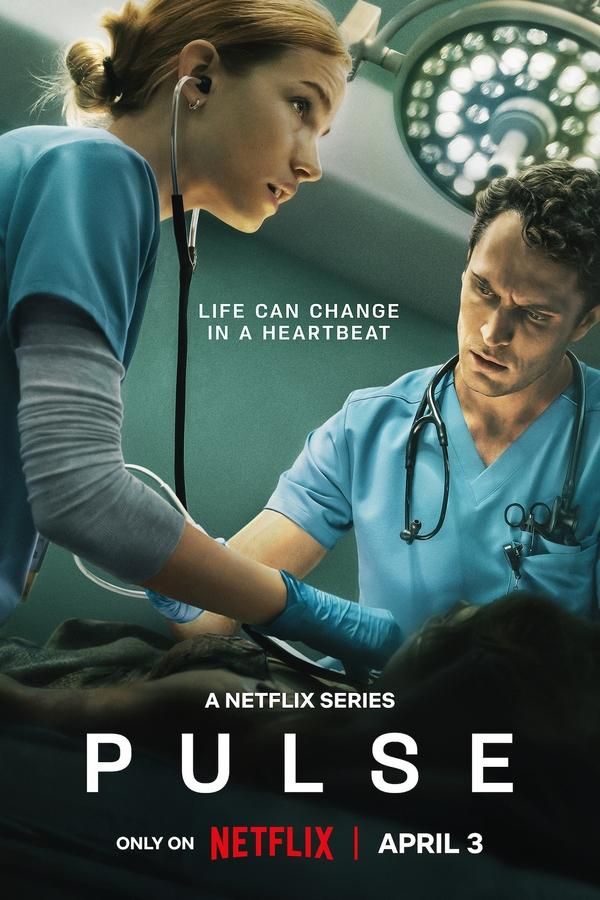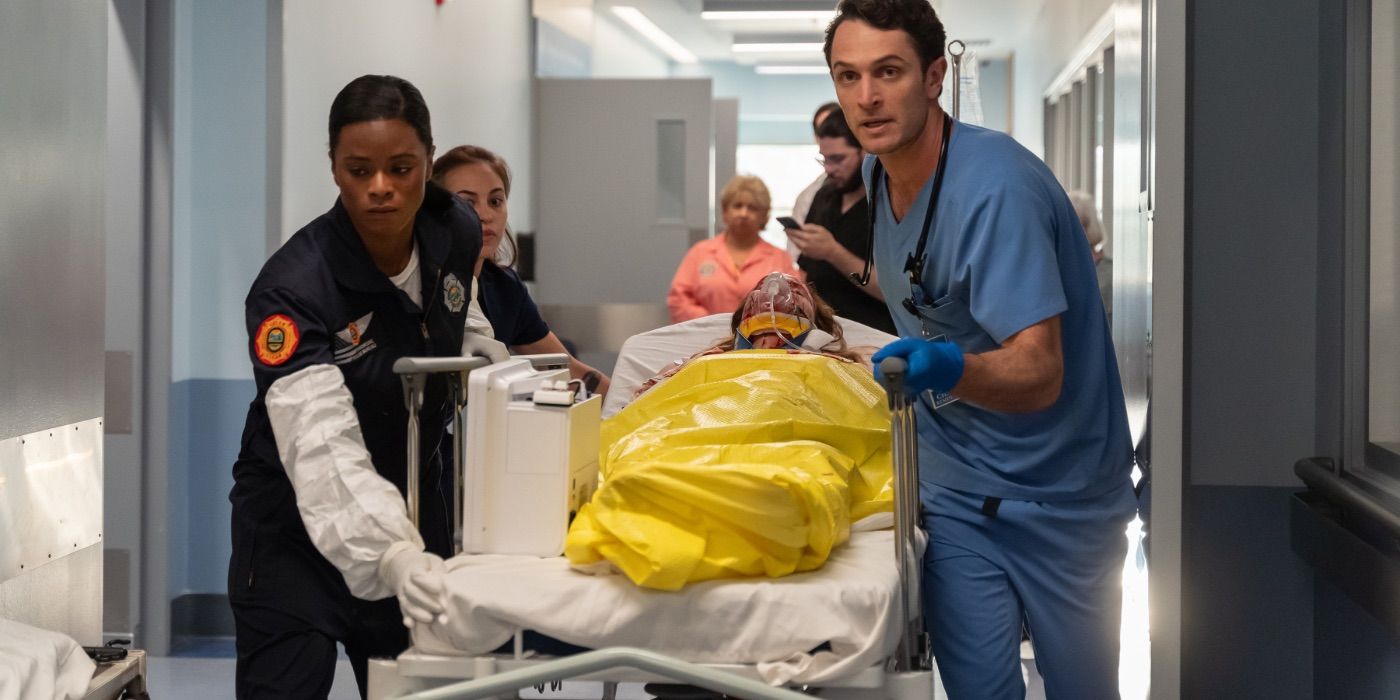Maybe I’ve become desensitized to the sight of crowded ER rooms in the middle of an extreme life-or-death scenario on television. After watching Grey’s Anatomy tackle everything from a hospital shooting to a deadly plane crash, the first few episodes of Netflix’s Pulse, which takes place during a massive hurricane in Miami, didn’t elevate my blood pressure in the slightest. The streamer’s first English-language medical drama attempts to break the formula in a genre that is already oversaturated, achieving a mere fraction more than what we’ve already seen time and time again.
Created by Zoe Robyn, who serves as showrunner alongside Carlton Cuse (best known for series like Lost, Bates Motel, and the acclaimed limited series Five Days at Memorial), Pulse follows a third-year resident at Miami’s busiest Level 1 Trauma Center who learns that she is temporarily replacing the chief resident she’d previously reported to HR for sexual harassment. Alongside the side-eye she receives for making said complaint, there’s a lot of pressure on her shoulders to prove her ability to save lives while leading the ER during a massive storm. Although this is an interesting hook, the rest of Pulse‘s story leads to this narrative direction feeling like a missed opportunity in adding to the workplace harassment discourse, particularly in a hospital setting where power dynamics are at play.
What Is ‘Pulse’ About?
Dr. Danielle “Danny” Simms (Willa Fitzgerald) is a skilled resident who has been working under Dr. Xander Phillips (Colin Woodell) at Maguire Hospital. Although her colleagues believe that she is the chief resident’s favorite based on her own merits, Danny’s reputation is called into question when she decides to report Xander to HR. (It’s also revealed, later on, that the two were in a long-term relationship that was being concealed from staff.) After Xander is discharged from his position, Danny is appointed to replace him, despite having no prior experience leading an ER. With the hospital operating at full capacity and severely injured patients being escorted in on stretchers, the entire situation unfolds like a waking nightmare.
Things only worsen when the medical center is deemed understaffed and Xander is invited back into the emergency room to help out. This adds another layer of stress for Danny, given that she’s already being closely watched by Maguire’s chair of surgery, Dr. Natalie Cruz (Justina Machado). From having panic attacks every time she walks past her former supervisor/boyfriend to trying to maintain her composure on the job, Danny is walking a tightrope with no room for error. It is in the midst of this stressful scenario that the viewer is introduced to Pulse, a series that balances extreme clinical cases and messy relationships between doctors. Sound familiar?
Netflix’s ‘Pulse’ Struggles To Find Its Own Identity
The biggest issue with Netflix’s Pulse is its lack of identity. Although Danny’s situation might seem like a fresh take, the initial appeal quickly fades once it’s revealed that she and Xander were romantically involved. There’s nothing about this plotline that hasn’t been tackled in other medical dramas, including Shonda Rhimes‘ hits like Grey’s Anatomy and Private Practice. Considering how popular The Pitt has become for not giving in to on-call romance and focusing on the less glossy aspects of a hospital setting, Pulse doesn’t have the necessary “it factor” to compete for viewers’ attention right now.
In addition to Danny and Xander’s complicated relationship, another surgical resident becomes torn between his feelings for a patient and his more casual bond with a hospital colleague. It’s reasonable that you might have flashbacks to Season 2 of Grey’s Anatomy while watching Dr. Tom Cole (Jack Bannon) and paramedic Nia Washington (Ash Santos) on-screen. There are so many parallels to similar events that took place at Seattle Grace that it’s hard not to draw comparisons, and they get in the way of the viewer being able to experience the Netflix original for what it is and not what it bears unfortunate similarities to.
‘Pulse’s Characters Never Get the Development They Deserve
Pulse does have a lot of potential. Danny’s sister, Dr. Harper Simms (Jessy Yates), is a wheelchair user, and Episode 5 offers a piercing look at the challenges that a doctor with a disability experiences when working at a hospital, including family members prejudicially discrediting their capacity to operate on a child. Yet, beyond this installment, little attention is given to who Harper is as an individual, with the character often being used as a vessel for her sister’s storyline. It’s similarly exciting to watch Dr. Cruz, Dr. Ruben Soriano (Néstor Carbonell), and med student Camila Perez (Daniela Nieves) communicate with each other or with their patients in Spanish, considering the number of native speakers who live in Miami. Still, the series’ attempt at greater representation is merely surface-level.
Considering that most characters don’t get the depth they deserve, as well as Pulse‘s lack of story originality — both in terms of workplace dynamics and the clinical cases the doctors are working on — it’s hard to determine if the show will make it to another season (or whether it deserves to). But if it does, the hope is that more attention is given to the rest of the ensemble cast as opposed to Danny and Xander’s flimsy connection. From what has been shown thus far, the Netflix series only exists as more of a Grey’s Anatomy wannabe than a unique, blood-pumping medical drama.
All episodes of Pulse are available to stream on Netflix.

Even Willa Fitzgerald can’t save Netflix’s first English-language medical drama.
- Release Date
-
April 3, 2025
- Network
-
Netflix
- Directors
-
Kate Dennis
- The series attempts to bring in valid criticism of how disabilities are perceived in the hospital context.
- Danny’s sexual harassment storyline would’ve had potential, if it weren’t for her romantic link to Xander.
- Pulse has a hard time finding its identity, often relying on plotlines that were already done better in other medical dramas.
- Certain characters are never given the depth they deserve and function as vessels to the main character’s arc.
- The series falls flat when it comes to representation and instigating clinical cases.
Source link



